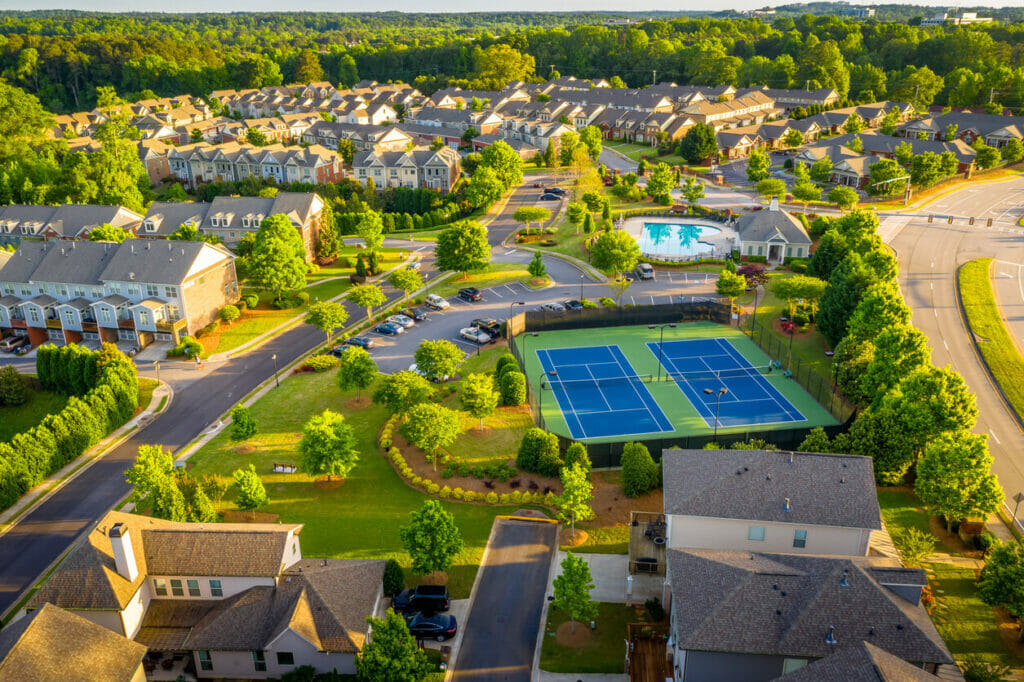Though gated communities are meant to establish privacy for members, there isn’t much mystery as to what these developments are. A gated community is a collection of homes that is accessible only to owners and their guests. The neighborhood is surrounded by walls or gates. There may be one or two entrances. Some communities have a guard booth with security staff to ensure only those with authorization get past the gate, while others use an automatic gate that owners can open with a key card, passcode or remote control.
Table of contents
- How to purchase a home in a gated community
- Pros of living in a gated community
- Cons of living in a gated community
Most gated communities have a name and a clear geographic definition, as marked by the barriers that control access to the neighborhood. Gated communities exist across the United States; some are very intimate while others are quite large.
All gated communities are homeowners associations. This is a requirement because the owners must be actively involved in paying for and maintaining the barriers and access points. Gated communities are intended to be pristine, exclusive and attractive. In order to keep the community that way, the owners need to pay fees. The upside to this is that HOAs usually come with a swimming pool, playground, dog park, clubhouse, and/or tennis courts.
How to purchase a home in a gated community
Purchasing a home in a gated community is similar to purchasing any other type of home. You will need to go through a formal application process and demonstrate that you are qualified to purchase the home. However, it is recommended you work with a realtor who specializes in gated community real estate since it may be harder for the average person to find and view these types of homes by themselves.
Like any HOA, a gated community can apply a screening process to deny some prospective buyers, but the decision cannot be discriminatory or violate the Fair Housing Act. A buyer cannot be denied based on their race, religion, color, sex, age, disability, familial status, or national origin.
There are a few key legal reasons for associations to deny potential buyers:
- The candidate has violated a rule outlined in the governing documents
- The candidate has a track record of violating rules and regulations in the past
- There was a misrepresentation of materials on the candidate’s applications
- The candidate has been convicted of a felony for violent crimes or crimes involving property, and their civil rights have not been restored
Screening processes and criteria for denying buyers must be written in the HOA’s governing documents.
While most gated communities are open to accepting any qualified applicant, there are some that are designated as 55+ communities. These associations are geared towards people who are 55 or older, and offer a lot of social activities that people who are retired would enjoy. 55+ communities often have a rule that 80% of members must be at least 55 years old.
Pros of living in a gated community
People choose to live in gated communities because of their exclusivity and security. Homes in these developments also tend to sell for more than homes that do not belong to a gated neighborhood.
Safety and privacy
Unsolicited visitors and strangers don’t easily make it into secured neighborhoods. That alone is reason enough for some people to invest in a home that belongs to a gated community. Gated communities with security staff also help to reduce vandalism, theft and other crimes.
The reduction in car traffic is another big sell. Streets are generally safer for kids and pedestrians who live in the neighborhood.
Access to amenities
As previously mentioned, HOAs generally have amenities that are only available to owners and their guests. Amenities may include a gym, tennis court, golf course, clubhouse and pool.

Maintenance
A portion of HOA fees (sometimes referred to as dues) are used for regular maintenance and landscaping of common areas, roads, sidewalks, and curbs. This maintenance may even cover lawn care service and snow removal.
Higher resale values
Gated communities generally have higher property values. This means owners can get a higher sale price for the property if they decide to sell the home in the future. A 2018 report found that homes in gated communities sell for about $30,000 more. That number has almost certainly increased since the report was released.
Cons of living in a gated community
It will cost you more to live in a gated community. It’s also more challenging for couriers and guests to get to you.
Costs
Homes inside of gated communities are usually more expensive than similar homes outside of the gates. In addition to the HOA fees, there are increased security costs.
Restrictions
Homeowners associations have pages of rules and regulations. Rules are created and enforced to ensure the value of the property remains high, and homeowners remain safe and happy. As such, owners cannot make a lot of changes to their homes without permission from the association. For example, an owner may not have the ability to plant an apple tree in their front yard. But there will be a list of approved plants/trees for them to choose from. Other restrictions may limit paint colors, above-ground pools, vehicles, landscaping choices, sheds, signs, decks, and more.
Some gated communities have restrictions on pets, so pet owners must be very careful about the community they choose. These restrictions may vary from how many pets an owner can have to the types of breeds allowed in the community.
Every association has different CC&Rs, bylaws, and policies so it is important for interested buyers to read the governing documents before they purchase a property.
Owners who ignore or break rules may receive fines or could lose access to amenities. In very rare instances, HOAs may even place a lien against an owner’s home if a violation goes unresolved for too long.
More challenging for guests and couriers to enter
Some communities have gates that are unlocked when a correct number code is provided. But if not, it may be challenging for couriers or friends to get into the community. Owners may have to make special arrangements and use a package pickup store or locker for online deliveries.
When it comes to parties, some communities require hosts to register each guest ahead of time so that gate passes may be issued before the event. If a guest forgets their pass, then the host will have to give the gatehouse verbal confirmation that the guest has been invited over. That’s not a great way to start a party.
Further away from public amenities
Gated communities are constructed in quieter areas with a lot of space. However, that usually means they are not within walking distance from schools, shopping centers, grocery stores, or medical facilities.
More attractive target
Not all gated communities offer the level of safety that owners expect. Strangers and criminals can still get into these communities if they pose as a visitor, or if they tailgate and get past the barrier after it has been lifted for an owner. If there are no physical security guards on the premises, then these homes are just as vulnerable to criminal activity as homes that are not behind gates.
Ironically, gated communities may be more attractive to thieves since owners are likely to be more affluent. Criminals could break in with the hopes of stealing luxury cars, jewelry, cash, or electronics. Gated communities can also make owners feel like other areas of the city are more unsafe than they truly are.
Conclusion
Gated communities can offer owners additional security and comfort. All gated communities have HOAs due to the maintenance and services required to operate this type of neighborhood. They are a great option for some, but keep in mind that they come with additional costs and restrictions.























